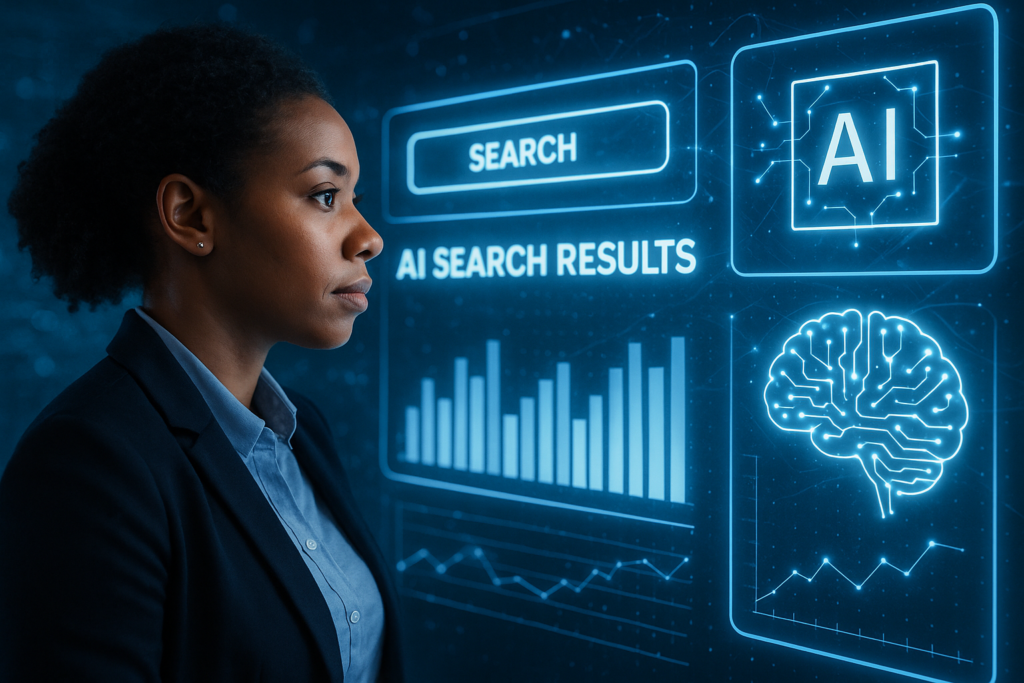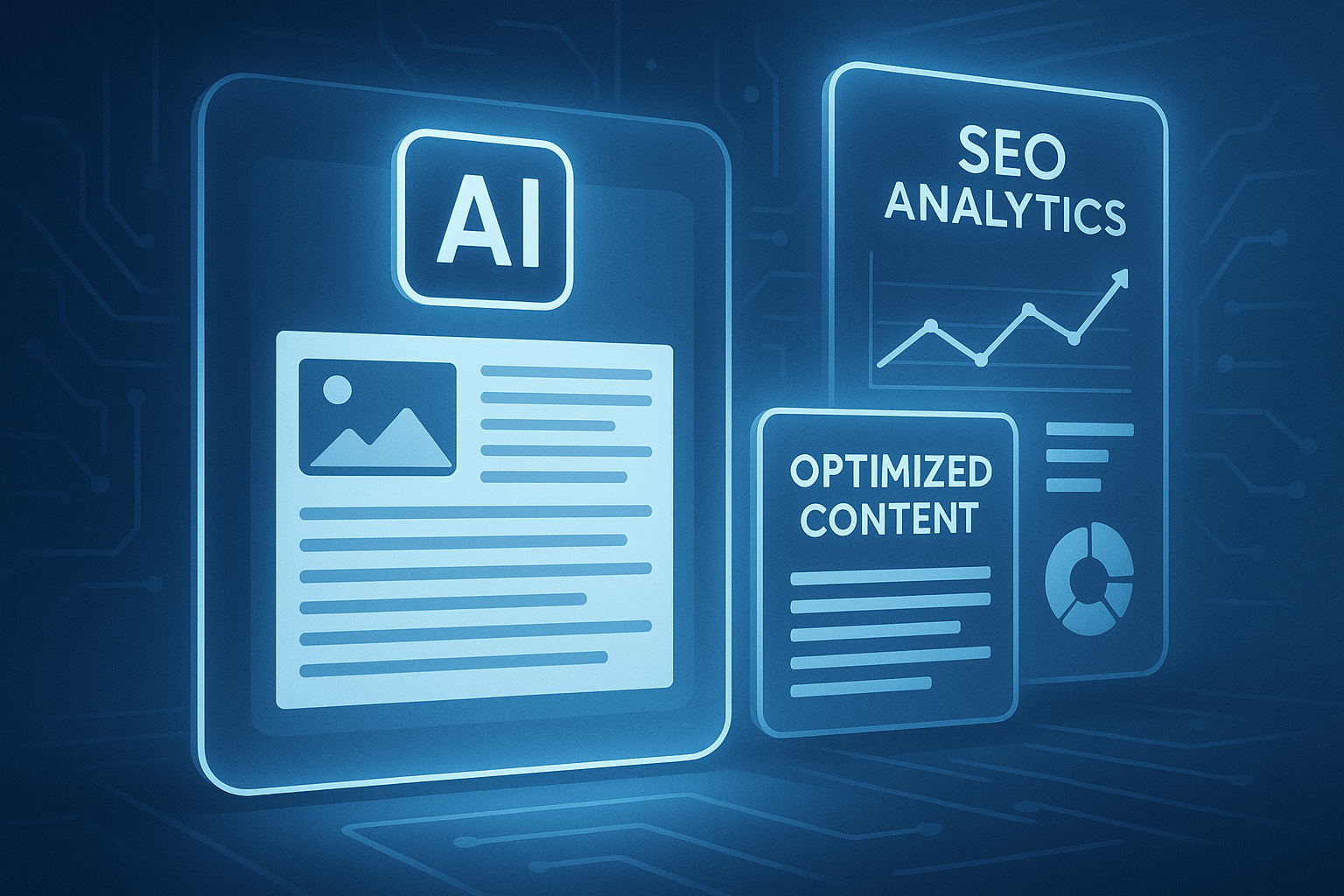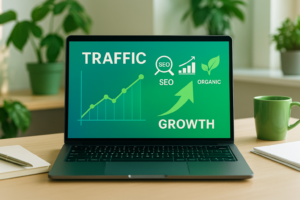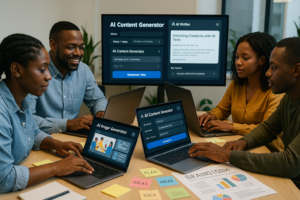The digital landscape is experiencing a seismic shift. Artificial intelligence, once a futuristic concept confined to science fiction, has become an integral part of how content is created, optimized, and discovered online. For marketers, content creators, and SEO professionals, understanding this transformation isn’t just beneficial—it’s essential for survival in an increasingly competitive digital ecosystem.
This revolution is happening faster than many anticipated. From AI-powered writing assistants to sophisticated algorithms that predict search intent, the tools and technologies reshaping content creation and search engine optimization are fundamentally changing the rules of digital engagement. But with this transformation comes both tremendous opportunity and significant challenges that every digital professional must navigate.
The AI Revolution in Content Creation
From Blank Page to Published Article: The New Reality
Not long ago, content creation was an entirely human endeavor. Writers would stare at blank screens, craft outlines, research topics, and painstakingly write every word. Today, AI tools can generate entire articles, suggest headlines, optimize tone, and even create accompanying images—all in minutes rather than hours or days.
Large Language Models (LLMs) like GPT-4, Claude, and Gemini have achieved unprecedented capabilities in natural language generation. These systems have been trained on vast corpuses of text, allowing them to understand context, mimic various writing styles, and produce coherent, contextually relevant content on virtually any topic. According to a 2024 survey by the Content Marketing Institute, over 73% of content marketers reported using AI tools in their content creation process, a dramatic increase from just 22% in 2022.
This doesn’t mean AI has replaced human writers. Rather, it has transformed the role from pure creation to curation, direction, and quality control. The most successful content strategies now leverage AI for ideation, first drafts, and optimization, while human expertise provides strategic direction, brand voice, emotional intelligence, and critical thinking that AI cannot replicate.

AI-Powered Content Tools: A New Arsenal
The ecosystem of AI content tools has exploded in recent years, each addressing different aspects of the content creation process:
Writing Assistants like Jasper, Copy.ai, and Writesonic can generate blog posts, social media content, product descriptions, and marketing copy based on simple prompts. These tools have evolved from producing generic, formulaic content to generating surprisingly nuanced and contextually appropriate material.
Content Optimization Platforms such as Clearscope, MarketMuse, and Frase analyze top-ranking content for target keywords and provide recommendations for topics to cover, questions to answer, and related terms to include. This data-driven approach removes much of the guesswork from content optimization.
Grammar and Style Checkers like Grammarly and ProWritingAid now use AI not just to catch typos but to suggest tone adjustments, improve clarity, and even detect plagiarism. These tools have become indispensable for maintaining content quality at scale.
Visual Content Generators including DALL-E, Midjourney, and Stable Diffusion create custom images, graphics, and illustrations from text descriptions, eliminating the need for stock photos or expensive custom photography for every piece of content.
Video Creation Tools such as Synthesia and Pictory use AI to generate video content, including realistic AI avatars that can deliver scripted content in multiple languages, democratizing video production for content creators with limited resources.
The Quality Question: Can AI Really Create Good Content?
This is perhaps the most debated question in digital marketing today. The answer is nuanced: AI can create grammatically correct, informative, and well-structured content. What it struggles with is originality, deep expertise, emotional resonance, and brand voice consistency.
Early AI-generated content was often generic, repetitive, and obviously machine-written. Modern AI has improved dramatically but still faces limitations. AI lacks personal experience, cannot conduct original research, and sometimes produces plausible-sounding but factually incorrect information—a phenomenon researchers call “hallucination.”
The highest-quality AI-assisted content typically follows a hybrid model: AI generates the foundation, providing structure and covering basic information, while human experts add unique insights, verify accuracy, inject personality, and ensure the content serves the reader’s actual needs rather than just filling space.
Research from Stanford University’s Human-Centered AI Institute suggests that content created through human-AI collaboration often outperforms purely human-created content in terms of production speed and comprehensive coverage, while maintaining comparable quality when properly supervised.
AI’s Impact on Search Engine Optimization
How Search Engines Have Evolved
To understand AI’s impact on SEO, we must first recognize that search engines themselves are powered by increasingly sophisticated AI. Google’s algorithm updates over the past decade—Panda, Penguin, Hummingbird, RankBrain, BERT, and MUM—have progressively incorporated machine learning and natural language processing to better understand search intent and content quality.
Google’s Search Generative Experience (SGE), launched in 2023 and expanded through 2024 and 2025, represents the most significant shift in search since the company’s inception. SGE uses AI to generate comprehensive answers directly in search results, synthesizing information from multiple sources. This fundamentally changes how users interact with search results and, consequently, how SEO must be approached.
Traditional SEO focused heavily on keywords, backlinks, and technical optimization. While these elements remain important, modern SEO increasingly emphasizes semantic understanding, user intent, content quality, and topical authority. AI has become essential for succeeding in this more sophisticated landscape.
AI-Powered SEO Tools and Strategies
Keyword Research and Topic Clustering: AI tools like SEMrush, Ahrefs, and Moz now use machine learning to identify not just keywords but entire topic clusters, understanding the relationships between concepts and how they map to user intent. This allows SEO professionals to create comprehensive content strategies that cover topics holistically rather than chasing individual keywords.
Content Gap Analysis: AI can quickly analyze competitors’ content, identify gaps in your coverage, and suggest opportunities where you can create superior content. Tools like Surfer SEO and MarketMuse use AI to provide data-driven recommendations for content improvements.
Technical SEO Automation: AI-powered platforms can automatically audit websites for technical issues, monitor site health, and even predict which technical problems will most impact rankings. This automation allows SEO professionals to focus on strategy rather than manual auditing.
Predictive Analytics: Machine learning models can now predict which content topics are likely to trend, which keywords will become more competitive, and which optimization strategies will yield the best ROI. This predictive capability allows for more proactive rather than reactive SEO strategies.
Personalized Search Results: As search engines use AI to personalize results based on user history, location, and behavior, SEO strategies must account for this variability. AI tools help identify patterns in personalized rankings and optimize for multiple user segments simultaneously.
The E-E-A-T Framework and AI Content
Google’s emphasis on E-E-A-T (Experience, Expertise, Authoritativeness, and Trustworthiness) has become even more critical in the age of AI content. As AI-generated content floods the internet, search engines have become more sophisticated at identifying and rewarding content that demonstrates genuine human expertise and experience.
This presents both a challenge and an opportunity. The challenge is that purely AI-generated content often lacks the experiential elements and deep expertise that Google values. The opportunity is that content creators who effectively combine AI efficiency with human expertise can produce high-quality content at unprecedented scale.
Content that ranks well in 2025 typically demonstrates clear human oversight, cites authoritative sources, provides unique insights or perspectives, includes first-hand experiences, and maintains consistent brand voice and quality standards. AI can assist with research, structure, and initial drafts, but the human element is what elevates content from adequate to exceptional.
The Changing Landscape of Content Discovery
Beyond Traditional Search: AI-Powered Discovery
The way people discover content is evolving rapidly. Traditional search engines remain important, but AI-powered discovery mechanisms are increasingly influential:
Conversational AI and Chatbots: Platforms like ChatGPT, Claude, and Google’s Bard are becoming alternative discovery mechanisms. Users ask questions conversationally and receive synthesized answers, often without clicking through to source websites. This “zero-click search” trend poses challenges for traditional SEO strategies focused on driving traffic.
AI-Powered Recommendations: Social media algorithms, content platforms like Medium and Substack, and streaming services use AI to recommend content based on user behavior. Creating content optimized for these recommendation algorithms requires different strategies than traditional SEO.
Voice Search and Virtual Assistants: As voice-activated AI assistants become more prevalent, optimization for conversational queries and featured snippets grows in importance. Voice search typically yields a single answer rather than a list of results, making the competition for that top position even more intense.
The Rise of Answer Engines
We’re witnessing a shift from search engines to answer engines. Rather than providing links to find answers, AI-powered systems increasingly provide answers directly. This transformation has profound implications for content creators and SEO professionals.
Content strategy must now consider not just ranking in search results but being cited by AI systems. This requires creating authoritative, well-structured content that AI can easily parse and reference. Structured data, clear hierarchies, and factual accuracy become even more critical in this environment.
Practical Strategies for Thriving in the AI-Content Era
Embracing AI While Maintaining Human Value
The most successful content strategies in this new era don’t choose between AI and human creativity—they strategically combine both. Here’s how:
Use AI for Efficiency, Humans for Excellence: Deploy AI for time-consuming tasks like research, outlining, and first drafts. Reserve human effort for adding unique insights, storytelling, and ensuring quality. This allows you to produce more content without sacrificing quality.
Develop a Clear Content Workflow: Establish processes that clearly delineate which tasks AI handles and where human intervention is necessary. For example, AI might generate a draft based on keyword research and topic briefs, then human editors refine the voice, add expertise, verify facts, and optimize for your specific audience.
Invest in AI Literacy: Content teams must understand AI capabilities and limitations. Training your team to effectively prompt AI tools, recognize their weaknesses, and know when human expertise is non-negotiable becomes a critical competitive advantage.
Focus on What AI Can’t Do: Double down on content that requires genuine human elements: original research, unique experiences, controversial opinions, deep expertise, emotional storytelling, and content that builds your brand’s distinctive voice. These are areas where AI struggles and human creativity shines.

Optimizing for AI-Powered Search
As search engines become more AI-driven, optimization strategies must evolve:
Prioritize Semantic SEO: Focus on comprehensive topic coverage rather than keyword stuffing. Use natural language and variations that AI can understand as related to your core topics. Tools like Google’s Natural Language API can help you understand how AI interprets your content.
Structure for AI Understanding: Use clear headings, structured data markup (Schema.org), and logical information architecture. AI systems rely on these structural elements to understand and categorize your content.
Create Cite-Worthy Content: As AI systems synthesize information from multiple sources, becoming a frequently cited source becomes crucial. This means creating comprehensive, authoritative content with clear facts, data, and unique insights that AI systems can confidently reference.
Optimize for Featured Snippets and SGE: Structure content to directly answer specific questions. Use formats like numbered lists, bullet points, and concise definitions that search engines can easily extract and display as featured snippets or in AI-generated responses.
Build Topical Authority: Rather than creating isolated articles on random topics, develop comprehensive content hubs around specific subjects. This signals to both human readers and AI systems that you’re an authoritative source on those topics.
Quality Control in the Age of AI Content
With AI making it easier than ever to produce content at scale, maintaining quality becomes both more challenging and more important. Here are essential quality control practices:
Implement Rigorous Fact-Checking: AI can confidently present false information. Every AI-generated claim should be verified by human editors before publication. This is non-negotiable for maintaining credibility.
Use Plagiarism and AI Detection Tools: While not perfect, tools like Copyscape, Turnitin, and GPTZero can help identify plagiarized or obviously AI-generated content that may harm your credibility or rankings.
Maintain Brand Voice Consistency: Create detailed style guides and train AI tools (and human editors) to maintain your brand’s distinctive voice. Inconsistent tone across AI and human-created content damages brand identity.
Monitor Performance Metrics: Track engagement metrics, rankings, and conversions for AI-assisted content versus traditional content. Use this data to continuously refine your approach and identify where AI adds value versus where human creation performs better.
Ethical Considerations and Challenges
Transparency and Disclosure
A growing debate centers on whether content creators should disclose when AI has been used in content production. Some argue for transparency, believing audiences deserve to know. Others contend that disclosure is unnecessary if the content meets quality standards.
Major publications have taken varying approaches. The Associated Press uses AI for certain types of reporting but maintains editorial oversight. The Washington Post developed its own AI tool, Heliograf, for generating simple news reports but clearly distinguishes this from reporter-written content.
Best practices are still emerging, but a reasonable approach involves disclosing AI use when it’s material to the content (such as AI-generated analysis or predictions) while treating AI as a tool similar to word processors or research databases when used for assistance rather than wholesale generation.
The Authenticity Challenge
As AI-generated content proliferates, audiences are becoming more skeptical. Content that feels generic, lacks perspective, or seems to regurgitate common knowledge without adding value is increasingly ignored, regardless of its technical quality.
This creates an authenticity premium. Content that clearly demonstrates human insight, experience, and perspective stands out more than ever. Paradoxically, AI may actually increase the value of authentically human content by making its scarcity more apparent.
Employment and Industry Transformation
The impact of AI on content creation jobs is perhaps the most controversial aspect of this transformation. Some fear widespread job displacement as AI makes it possible to produce content with fewer human workers. Others see AI creating new opportunities and roles.
The reality appears to be somewhere in between. Entry-level content writing positions are likely most at risk, while roles requiring expertise, creativity, strategy, and judgment remain highly valuable. New positions are emerging: AI content strategists, prompt engineers, and AI-human content coordinators represent entirely new career paths.
The most secure approach for content professionals is to develop skills that complement rather than compete with AI—strategic thinking, subject matter expertise, creative direction, and the ability to effectively leverage AI tools while maintaining quality standards.
The Future: What’s Next for AI, Content, and SEO
Emerging Trends and Technologies
The AI revolution in content and SEO is far from complete. Several emerging trends will likely shape the next phase:
Multimodal AI: Future AI systems will seamlessly work across text, images, video, and audio, enabling truly integrated content creation. This will make it possible to generate complete multimedia content packages from a single brief.
Hyper-Personalization: AI will enable content that dynamically adapts to individual readers based on their preferences, behavior, and context. This personalization will extend beyond simple recommendations to customized content variations.
Real-Time Content Optimization: AI systems will continuously monitor content performance and automatically suggest or implement optimizations, making SEO an ongoing, dynamic process rather than periodic manual updates.
AI-Generated Interactive Experiences: Rather than static articles, AI will create interactive, conversational content experiences that adapt based on user questions and interests, blurring the line between content and application.
Automated Content Ecosystems: Sophisticated AI systems will manage entire content ecosystems, automatically identifying gaps, generating appropriate content, optimizing for performance, and updating or retiring outdated material.
Preparing for an AI-Driven Future
To remain relevant and competitive in this rapidly evolving landscape, content creators and SEO professionals should:
Stay Informed: AI capabilities are advancing rapidly. Regularly experimenting with new tools and staying current with industry developments is essential. Subscribe to AI and SEO newsletters, participate in professional communities, and allocate time for ongoing education.
Develop Complementary Skills: Focus on capabilities that enhance rather than duplicate AI strengths. Critical thinking, ethical judgment, strategic planning, and deep domain expertise become more valuable, not less, in an AI-augmented world.
Experiment and Iterate: The most effective AI-content strategies are discovered through experimentation. Test different tools, workflows, and approaches. Measure results carefully and iterate based on what works.
Build Human Connections: As content production becomes more automated, the value of genuine human relationships increases. Building an authentic community around your content and brand creates sustainable competitive advantages that AI cannot easily replicate.
Maintain Ethical Standards: As AI makes it easier to produce content at scale, maintaining high ethical standards around accuracy, transparency, and user value becomes a critical differentiator.
Conclusion: Embracing the Transformation
The integration of AI into content creation and SEO represents one of the most significant shifts in digital marketing history. Like all technological revolutions, it creates both disruption and opportunity.
Those who resist this transformation risk obsolescence. Those who embrace it without thoughtful consideration risk producing generic, low-value content that fails to connect with audiences or rank in search results. The winning approach lies in the middle: strategically leveraging AI’s capabilities while doubling down on distinctively human strengths.
The future belongs to content creators and SEO professionals who understand that AI is a tool, not a replacement for human creativity, expertise, and judgment. It’s a powerful tool that can dramatically enhance efficiency and capabilities, but it requires skilled human direction to produce content that truly resonates, ranks, and drives results.
As we navigate this transformation, the fundamental goal remains unchanged: creating valuable content that serves real human needs. AI has simply given us new tools to achieve that goal more efficiently and effectively. The challenge—and the opportunity—lies in using those tools wisely while maintaining the human elements that make content genuinely valuable.
The content creators and SEO professionals who will thrive in this new era are those who view AI not as a threat or a silver bullet, but as what it truly is: a powerful tool that, when wielded with skill and judgment, can help us create better content, reach more people, and deliver greater value than ever before.
The transformation is here. The question is not whether to adapt, but how to do so in ways that maintain quality, authenticity, and value while harnessing the unprecedented capabilities that AI provides. Those who answer that question successfully will find themselves not just surviving but thriving in the AI-powered future of content and search.
References
- Content Marketing Institute. (2024). “B2B Content Marketing Benchmarks, Budgets, and Trends.” Retrieved from https://contentmarketinginstitute.com/
- Google Search Central. (2024). “Google Search’s Guidance About AI-Generated Content.” Retrieved from https://developers.google.com/search/docs/fundamentals/creating-helpful-content
- Patel, N. (2024). “The Future of SEO: How AI Is Changing Search Engine Optimization.” Neil Patel Digital. Retrieved from https://neilpatel.com/
- Stanford University HAI. (2024). “Artificial Intelligence Index Report 2024.” Retrieved from https://aiindex.stanford.edu/
- Gartner. (2024). “Predicts 2024: Generative AI Transforms Content Creation and Management.” Retrieved from https://www.gartner.com/
- Search Engine Journal. (2024). “How AI Is Changing SEO and Content Marketing.” Retrieved from https://www.searchenginejournal.com/
- Moz. (2024). “The State of AI in SEO: What Marketers Need to Know.” Retrieved from https://moz.com/
- HubSpot. (2024). “State of Marketing Report 2024.” Retrieved from https://www.hubspot.com/
- McKinsey & Company. (2023). “The Economic Potential of Generative AI.” Retrieved from https://www.mckinsey.com/
- MIT Technology Review. (2024). “How AI-Generated Content Is Reshaping the Internet.” Retrieved from https://www.technologyreview.com/
- BrightEdge. (2024). “Content Marketing and SEO Trends Report.” Retrieved from https://www.brightedge.com/
- Ahrefs. (2024). “The Impact of AI on SEO: Data and Insights.” Retrieved from https://ahrefs.com/blog/




